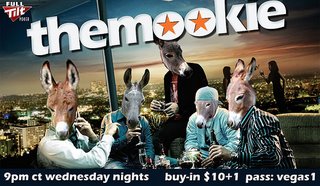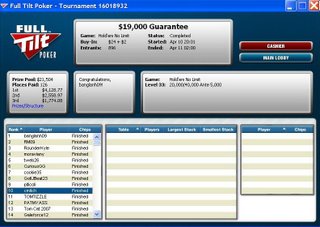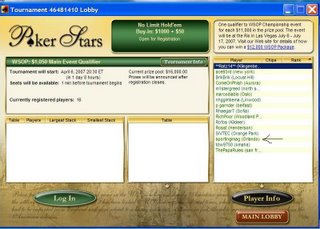Link to Press Release
Barney Frank is introducing a bill today that would regulate online gambling. I'm not sure how well it will be received, but it is a great start.
Below is the a copy of the press release:
Frank Introduces Internet Gambling Regulation and Enforcement Act of 2007
Washington, DC - Rep. Barney Frank (D-MA) today introduced the Internet Gambling Regulation and Enforcement Act of 2007 that would create an exemption to the ban on online gambling for properly licensed operators, allowing Americans to lawfully bet online.
The Act establishes a federal regulatory and enforcement framework to license companies to accept bets and wagers online from individuals in the U.S., to the extent permitted by individual states, Indian tribes and sport leagues. All such licenses would include protections against underage gambling, compulsive gambling, money laundering and fraud.
“The existing legislation is an inappropriate interference on the personal freedom of Americans and this interference should be undone,” said. Rep. Frank.
In 2006, the House passed the Unlawful Internet Gambling Enforcement Act, restricting the handling of payments by U.S. financial institutions for unlawful forms of Internet gambling. That law prohibits the use of payment instruments by such institutions to handle the processing of any form of Internet gambling that is illegal under U.S. federal or state law.
Traditional forms of legalized gambling already exist in nearly every state. By continuing to prohibit Internet gambling in the U.S., the U.S. has left Americans who choose to gamble online without meaningful consumer protections. The proposed legislation would institute practical and enforceable standards to bring transparency to Internet gambling and provide consumers the protections they expect and deserve.
The Financial Services Committee will hold a hearing entitled, “Can Internet gambling be regulated to protect consumers and the payments system?” at a date to be determined in June, 2007.
Q&A About the Internet Gambling Regulation and Enforcement Act of 2007:
LICENSE REQUIREMENTS
How will the government ensure that the proper consumer protections are put in place?
No applicant would receive a license unless the following requirements with respect to any Internet bet or wager, at a minimum, are met:
• Safeguards to ensure the individual placing the bet or wager is 18 years of age or older
• Safeguards to combat fraud and money laundering and compulsive gambling
• Mechanisms to ensure all appropriate taxes and fees are collected from individuals and the licensees
• Safeguards to ensure that the individual placing the bet or wager is physically located in a jurisdiction that permits that form of Internet gambling
What safeguards would be implemented to ensure that licenses are granted only to qualified Internet gambling operators?
Applicants for a license would be required to provide comprehensive financial statements and corporate structure documents, and to agree to be subject to U.S. jurisdiction and all applicable laws related to Internet gambling. No license would be granted to any applicant convicted of a criminal violation of any law relating to gambling, money laundering, fraud or other financial laws. Licensing would be handled by the U.S. Treasury through its anti-money laundering agency, the Financial Crimes Enforcement Network (FinCEN).
CONSUMER SAFETY
How does the bill protect consumers?
The framework set forth in the bill would for the first time effectively regulate Internet gambling, thus making it possible to address underage and compulsive gambling, neither of which are prevented under prohibition regimes. Regulation combined with proven technology would establish a system of effective controls to block children and compulsive gamblers from gambling.
How can restrictions against underage Internet gambling be enforced?
Existing technology can enforce requirements that licensed Internet gambling operators restrict minors’ access to Internet gambling. For example, when registering at a gambling site, the customer would be required to provide a range of information including name, address, date of birth, telephone number and details of an identity document, such as a driver’s license or social security number. This information would then be passed on to the Payment Service Provider (PSP) and run through the Know Your Customer (KYC) system to confirm that the data being provided matches against several separate sources of information and is in fact accurate. The operators may also have KYC systems in place.
Operators could also request a physical copy of documentation, such as a utility bill and/or a copy of the customer’s identity document, for further verification.
Is it possible to identify and enforce restrictions on compulsive gambling?
There are a number of techniques that can be used, from systems that limit the total amount of funds that may be wagered based on credit limits, to the use of public databases that include details used to identify persons who have chosen to exclude themselves from online gambling. Customers could be added to this list at their own request.
Additionally, limits can be placed on the number of transactions a customer can put through on a daily, weekly and monthly basis, by the operator acting alone, by the credit card company, by the PSP, or by all three. In the event that an unusual spending pattern is noticed, these transactions could automatically be put on hold for further investigation.
FINANCIAL INTEGRITY OF INTERNET GAMBLING TRANSACTIONS
How will a license and regulation framework protect against money laundering and fraud?
Funds entering a gambling operator’s system are already resident in the banking network somewhere. That is, the funds have previously been deposited into a bank account at some stage, subjected to stringent KYC requirements, and which greatly increases the traceability of any funds entering the system. All transactions can also be checked at the time of authorization against a number of anti-fraud, money laundering and terrorism databases.
What additional security measures could be put in place to protect the consumer from merchant fraud?
Payment Service Providers could set-up escrow accounts for each licensee in which money is set aside for a period of time to ensure that when a financial transaction is successfully contested the operator immediately refunds the consumer. Therefore, any claim regarding the use of an unauthorized credit card could automatically result in a full repayment to the principal credit card holder.
STATES AND INDIAN TRIBES
Would individual states and Indian tribes have the option to opt-out of legalized Internet gambling?
To protect States’ and Indian tribes’ rights to control gambling activities within their respective geographic borders, the Act permits States and Indian tribes either to prohibit Internet gambling activities or impose limits on various types of Internet gambling activities.
Is it possible for restrictions to be enforced if individual states decide to “opt-out” from permitting persons in their states from Internet gambling?
Yes. In using the Internet, a customer’s IP address is broadcast to the operator, which can then be used to identify the state in which a customer resides with a 99 percent level of accuracy. This information is also made available and compared to the customer’s registration information. In the event the information differs, the transaction is not approved and the customer is prevented from engaging in Internet gambling.
SPORTS BETTING
If professional sports leagues and college associations decide to opt-out from allowing bets and wagers on their sporting activities, could that be enforced?
Yes. Under the proposed legislation, all licensed Internet gambling operators would be prohibited from accepting bets or wagers on sports leagues or associations that have opted-out. In the event of a violation, the operator’s license could be withdrawn and the operator may be prohibited from applying for a new license. As part of its contract with the Internet gambling operator, the PSP would be required to enforce these requirements throughout the collection and payment process.










